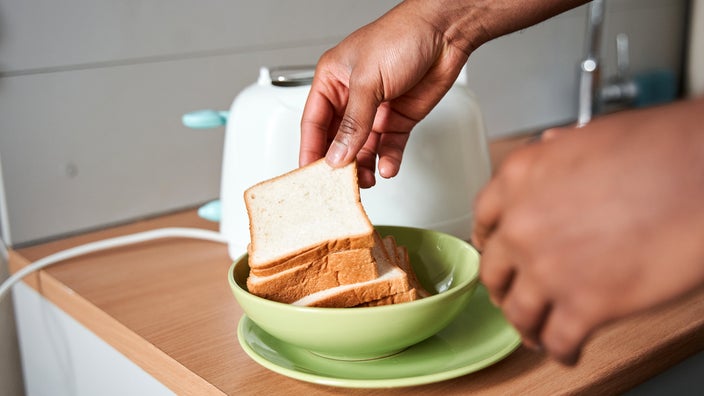
What Can You Eat After Appendicitis Surgery?
Key takeaways:
The best foods to eat after appendicitis surgery (appendectomy) are clear liquids and bland, easy-to-digest foods.
How quickly you can return to a normal diet after appendicitis surgery depends on the type of surgery you had and if there were any complications.
Once you’re ready for a regular diet, it’s a good idea to eat fiber-rich foods and drink enough water to avoid constipation.

You’ve just had surgery for appendicitis — this surgery is called an appendectomy. You’re hungry, and your body needs nourishment to help you heal. While you might feel ready to eat, you can’t go right back to your usual diet. Instead, you have to take a stepwise approach to give your bowels time to recover.
Read on to learn more about the recovery time after your appendectomy and the best foods to eat after surgery.
When can you eat after appendicitis surgery?
Most people are able to start eating within a few hours after their appendicitis surgery.
But exactly when you can eat after surgery depends on the type of surgery you need. Here are two common types of surgery to remove your appendix:
Open appendectomy: During this surgery, the surgeon cuts directly into your abdominal wall, right over the appendix. Then they move your muscles and tissues out of the way to reach and remove your appendix. This is a more invasive surgery.
Laparoscopic appendectomy: This surgery is less invasive. In a laparoscopic surgery, a surgeon makes small incisions near your belly button. Using a camera and surgical instruments, the appendix is removed through one of the holes. People generally recover faster from laparoscopic surgery since it’s less invasive, which means you can start eating sooner.
After appendicitis surgery your recovery time — and when you can eat again — also depend on whether there were any complications from the appendicitis. For example, you may have had complications like an abscess (infected tissue outside of the appendix) or a perforation (hole in the appendix).
These complications take a bit longer to heal from, which means you may have to wait longer to eat, walk, and leave the hospital.
Your surgical team will wait until your anesthesia wears off and then examine you again. They will tell you when you can start eating again based on your exam and how your surgery went.
What can you eat after appendicitis surgery?
You can usually start sipping water as soon as you wake up and your anesthesia wears off after surgery. Once your surgical team examines you, they’ll likely give you the “all clear” to drink other clear liquids such as:
Broth
Jell-O
Popsicles
Clear sodas (like sprite or ginger ale)
Fruit juices without pulp (like apple or cranberry juice)
If you’re able to consume these clear liquids without any trouble for about a day, your surgical team will give you the “OK” to start solid foods. Most people are able to eat solid food about 24 hours after appendicitis surgery.
Once you are cleared to eat solid foods, it’s best to start with bland and low-fat foods such as:
Well-cooked, soft cereals
Mashed potatoes
Plain toast
Plain crackers
Plain pasta
Rice
Cottage cheese
Pudding
Low-fat yogurt
Ripe bananas
You’ll want to try small meals at first. Smaller meals are easier for your body to digest. Eating six to eight small meals a day can be gentler on your healing gut than three regular-sized meals. Plus, smaller meals cause less stomach stretching (distension). Stretching can put stress on your healing gut and stitches, leading to pain.
After 1 to 2 days, try to incorporate high-fiber foods like whole grains, fruits, and vegetables into your diet. And make sure to drink enough water. These two changes can help you fight off the constipation that often happens after surgery.
People develop constipation after surgery for several reasons:
Pain medications: Most people need some to take pain medications for a few days after having their appendix removed. Opioid pain medications help with pain control, but they also cause constipation.
Slow gut movement: You’ll want to take it easy after surgery. But being less active can also slow down your gut. And your gut is also trying to recover from both appendicitis and surgery. This means it may not work as well as it usually does. These two things will slow down your gut, increasing your risk of developing constipation.
What should you not eat or drink after appendicitis surgery?
There are some foods you should avoid after having your appendix removed, even if you get the all clear to go back to your regular diet.
Try to avoid high-fat and fried foods. They can cause indigestion, nausea, and diarrhea. After appendicitis surgery, try to limit or avoid foods like:
Red meat
Processed foods
Pizza
Frozen dinners
Sugary desserts, like cakes and donuts
Are there any permanent dietary changes you should make after appendicitis surgery?
No. You don’t need to permanently change your diet if you’ve had your appendix removed.
The appendix is part of the intestine, so it’s natural to assume that your intestines won’t work the same without it. But according to Dr. Emilia Genova, a general surgeon with Hartford Healthcare, the appendix doesn’t help with digestion. So, there isn’t any need to make long-term dietary changes after having your appendix removed.
But again, it depends on the circumstances surrounding your appendectomy. Dr. Genova said, “Sometimes, if the patients have been ill, have had a perforation of the appendix, or needed a more extensive surgery — such as bowel resection — diet changes may be indicated.” But even in these cases, Dr. Genova noted that these changes are usually only temporary and short term.
When should you contact your healthcare provider after appendicitis surgery?
It‘s normal to have some mild abdominal discomfort and nausea after appendicitis surgery. If you had laparoscopic surgery, you might also notice some shoulder or neck pain from the gas used to inflate your abdomen during surgery. These symptoms will improve with time.
But some symptoms are more concerning. You should contact your surgical team right away if:
Your pain isn’t getting better after 2 or 3 days
Your pain is getting worse at any time after surgery
You’re unable to keep food or liquids down
You haven’t had a bowel movement within 48 hours after surgery
You develop a fever
You notice redness, discharge, swelling, or pain around your incision (stitches)
The bottom line
Most people can start drinking clear liquids right after appendicitis surgery and eat solid food within 24 hours. But it’s best to start with soft, bland foods once you are cleared to get back to a solid diet. After 2 or 3 days, you can get back to your normal diet. But make sure to add fiber and water. This can help you avoid constipation, which is common after surgery.
Why trust our experts?



References
Alotaibi, A. M., et al. (2022). Complicated appendicitis increases the hospital length of stay. Surgery Open Science.
Better Health Channel. (2012). Appendectomy. Victoria State Government.
Biondi, A., et al. (2016). Laparoscopic versus open appendectomy: A retrospective cohort study assessing outcomes and cost-effectiveness. World Journal of Emergency Surgery.
Jones, M. W., et al. (2023). Appendicitis. StatPearls.
Kaiser Permanente. (2011). Appendectomy.
MedlinePlus. (2022). Clear liquid diet.
MedlinePlus. (2023). Laparoscopy.
Michigan Medicine. (n.d.). Taking care of myself after laparoscopic appendectomy. University of Michigan.
Saint Luke’s Health. (n.d.). After laparoscopic appendectomy (appendix removal).







